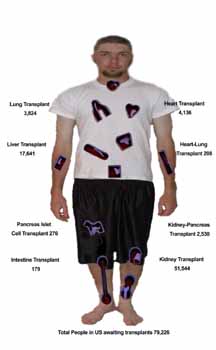National Organ and Tissue Donation Awareness Week approaching
As National Organ and Tissue Donation Awareness Week approaches, Intermountain Donation Services shares its motto with others in exchange for restoring life among many critical patients.
This motto is “Sharing life through organ and tissue donation.”
According to a Donate Life brochure, the person who receives an organ depends on several criteria. What counts is the severity of the illness, the time spent waiting, the patient’s blood type and other important medical information.
Alex McDonald, a staff member at Intermountain Donation Services, said 78,000 people are currently waiting for an organ transplant. Approximately 250 of those patients are in Utah. About 17 to 20 patients die each day waiting for an organ or tissue transplant. Every 13 minutes another name is added to the national transplant waiting list.
According to the brochure, doctors will not work any less on a patient in an emergency room even if the patient is a registered donor. If someone is sick or injured and admitted to the hospital, the number one priority is to save that person’s life. Organ donation can only be considered if the patient dies and after the family has been consulted.
Just one deceased donor can save or enhance the lives of more than 50 people, according to the brochure. Someone who donates both their kidneys can save two people from dialysis treatments, which are needed to sustain the patients’ lives. Donating bone marrow can help repair injured bones and joints.
In 2000, approximately 750,000 tissue transplants and 22,854 organ transplants were performed, according to the brochure.
According to the Web site www.idslife.org, 73 percent of donor families believe something positive will come from their loss. Approximately 56 percent believe their loved one can live on.
McDonald said there is a statewide fund to help families with the financial means needed to receive an organ or tissue transplant.
“Money is hard on [the patient’s] family,” he said.
Several mothers of liver transplant recipients founded the Kurt Oscarson fund in 1995. The fund memorializes Kurt Oscarson who died four years ago from cancer. Anyone can donate financially to the Kurt Oscarson fund by checking a box on their tax forms.
Through this fund, all families who have lived in Utah for at least six months are qualified to receive financial help of $10,000 per transplant per child under age 18, McDonald said.
According to the Web site there are two types of donors: The Heart Beating Donor, who can be an organ and/or tissue donor must remain on a ventilator for several hours and meet brain death criteria, and The Non-Heart Beating Donor, who can only donate tissue because tissue cannot be recovered after 24 hours after death. According to the Web site, family members should be well-informed by doctors during a potential donor’s hospitalization. The doctors at the hospital should answer all of the family’s questions to the best of their [the doctors’] understanding.
Doctors should help the family come to an acceptance of the diagnosis and assess the family’s readiness to be approached about organ and tissue donation, according to the Web site.
The doctors or other specialized medical staff should not be afraid to make sure the offer of donation is presented to a family. No one can tell them anything worse than they have already heard, according to the Web site.
McDonald said National Organ and Tissue Donation Awareness Week runs April 21 to 27. The centerpiece of the week is presenting the Utah Donor Registry.
April 16 at the State Capitol in Salt Lake City, Governor Mike Leavitt and his wife Jackie will be the first to sign the registry, he said.
The purpose of the Utah Donor Registry is to allow recovery agencies to access the registry 24 hours a day, seven days a week. Even though the donor’s driver’s license will say whether or not the person is a donor, not all licenses are recognizable, McDonald said.
According to the Web site, discount Lagoon Amusement Park Tickets are available April Saturday, Sunday, and April 20, 21, 27 and 28 with a coupon from Intermountain Donor Services. Lagoon will rebate $1 to Intermountain Donor Services for each coupon.
From April 21 to 27, a donation information booth will be available at many hospitals in Utah.
Other events during the week include an awareness walk, a donor family recognition event and tree planting ceremony, and the Pledge Program luncheon. For more information on scheduling and events, visit www.idslife.org.

